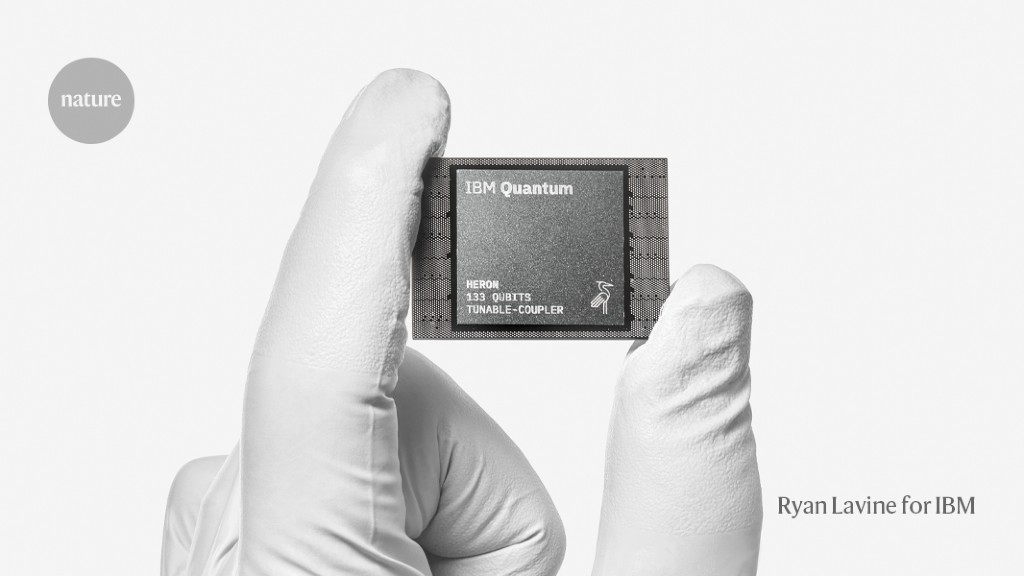Doom port pls, it’s the law.
It can play doom and not play doom and be in various stages in between.
You don’t know if you’re playing DOOM or WOOD until you look
So statistically, on average, it just about plays Doom
Plays 0.01% of doom and the rest is noise
Noice
Wait, seriously? That’s quite a jump from the last one I heard about.
Also: it’s actually 1,121 qubits, even more impressive.
Isn’t that also quite the small form factor? I still had the fridge sized copper monstrosities in mind when thinking of quantum computers
The attached picture says 133 qubits, so whatever that chip is (edit: Heron) it’s not this thing.
IBM’s post (that the article links) says:
Breaking the 1,000-qubit barrier with Condor
We have introduced IBM Condor, a 1,121 superconducting qubit quantum processor based on our cross-resonance gate technology. Condor pushes the limits of scale and yield in chip design with a 50% increase in qubit density, advances in qubit fabrication and laminate size, and includes over a mile of high-density cryogenic flex IO wiring within a single dilution refigerator.
So, it sounds like this is actually another fridge sized system.
without a room temperature super conductor it will always be mostly cooling
These qubits oscillate at microwave frequencies where the quantum information is stored. This means they need to be kept at a temperature where the microwave frequencies are completely devoid of any thermal noise. For microwave frequencies, this temperature is just a few millikelvins above absolute zero. Unfortunately, the temperature is required due to the fundamental nature of thermal noise due to temperature. Making the qubits out of room temperature superconductor would not solve the problem of the need to cool them down - unless they can be operated at higher frequency. There are quantum computers made using light/optical photons which do operate at room temperature because optical photons are at much higher frequency which has no thermal noise even at room temperature.
So, in conclusion, everytime you hear about superconducting qubit, they are always in a giant dilution refrigerator which gets bigger for more qubits as more connections from room temperature to qubits are needed.
It looks more like Darth Vader’s water heater.
I may be mistaken but the fridge sized copper monstrosity is the system that cool the quantum chip, so unless they miniaturized the cooling system it didn’t change.
Yeah, from my understanding, the chip itself is about the same size as a CPU chip.
From what I remember the chip itself is pretty small, the size is all due to the cooling component.
Also keep in mind you’ve probably seen a development version of a quantum computer, where things are set up to be easily accessible to allow fixing and tinkering, without regard for size and optimization of space.
It’s faster than Moore’s law, but I don’t know whether it can be sustained.
For years, IBM has been following a quantum-computing road map that roughly doubled the number of qubits every year. The chip unveiled on 4 December, called Condor, has 1,121 superconducting qubits arranged in a honeycomb pattern. It follows on from its other record-setting, bird-named machines, including a 127-qubit chip in 2021 and a 433-qubit one last year.
This really is amazing to see. It feels like just year when we were discussing 1, 2, or 10 qubits.
Are there any/many current uses for these quantum computers?
breaking encryption algorithms
From what i heard, even 1,000 qubits isn’t close to enough for modern passwords: https://www.nature.com/articles/d41586-023-00017-0
Paywall. Also, passwords and RSA are two different things.
Reversing hashing algos is what people mean when they talk about quantum computers cracking passwords / encryption, though.
No, they mean breaking RSA. The industry standard methods of storing passwords are resistant to QC attacks. Passwords could be broken while being passed between client and server under existing algorithms, but not the databases they’re stored in.
For now they are only being used for research purposes. For example, simulating Quantum effects in many atom physics and implementing error correction for future quantum computers. Any real applications still need some time but the pace of development is really quite something.
Currently, there is basically only one real world application we really know: Factoring numbers into prime factors. And we can’t know for sure whether there will be more even.
Sorry, but that’s completely wrong. There has been a lot of research into quantum algorithms, and we have many examples besides Shor’s algorithm, for example: https://www.amarchenkova.com/posts/5-quantum-algorithms-that-could-change-the-world
I am a physicist and truly appreciate the effect of quantum computing on our simulations, but with “real world” I meant proper industrial use. And for that, there are hardly any algorithms known except Shor’s. When the CEO of Deutsche Bank says he will do his bank transactions on a quantum computer, you know the topic is over-hyped.
You’re still wrong. Quantum computers have use for developing new medications through simulating chemical interactions, and in making logistics more efficient. The hit against encryption is vastly overrated, and may not even be feasible.
I understand that you can’t just translate random algorithms to quantum computers and expect them to run better - but I did link an overview of 5 quantum algorithms that have real world uses, and Shor’s is only one of them.
I don’t consider Sabine Hossenfelder a person worth listening to. She frequently comments on topics she doesn’t know much about/has a very biased view of (e.g. her transphobic video).
Yeah, Hossenfelder has had a bad habit of stepping outside of her lane. From what I’ve heard from physicists, she’s questionable even inside her lane.
She might have strong opinions on particle physics and I do take them with a grain of salt, but I don’t see objectively wrong things in there.
Are you talking about her video on trans athletes? I don’t remember it being transphobic.
I’m talking about her video on transitions in general, not sure if you’re referring to that or something else. She misrepresented the state of research (implying there’s less research concluding transitions to be a good thing than there really is) and shared misinformation.
Wasn’t there a study that, with the current approach of evaluating an average to break it down to a few finite states, they might never be able to do for what they were developed; cracking passwords?
If by “cracking passwords” you mean reversing password hashes in a database, quantum computers aren’t going to make a big dent there. The standard industry ways of doing that wouldn’t be affected much by QCs. Breaking encryption, OTOH, with QCs is a concern, but also vastly overrated. It would take orders of magnitude more qubits to pull off than what’s been worked on so far, and it may not be feasible to juggle that many qubits in a state of superposition.
I get really annoyed when people focus on breaking encryption with QCs. They are far more interesting and useful than that.
QC can make logistics more efficient. Have you ever seen photos of someone unpacking a giant Amazon box holding one little micro SD card? Amazon isn’t dumb about these things, but our best methods of packing an entire truck is a guess. Packing algorithms would take too long to calculate how to perfectly pack it, so they come up with a solution that seems OK, and that leads to a few “filler” boxes that are unnecessarily large, among other inefficiencies. QC can solve this problem without taking the age of the universe to come up with a solution.
The order in which that truck delivers those packages can also be made more efficient with QC.
Then there’s molecular simulations, which have the promise of making medications that are more effective, more likely to pass trials, and with fewer side effects. This can be done far faster on a QC.
Interesting, I’ve only really heard of breaking encryption with them. Is there already a proven algorithm for packing that could be reasonably done with a qc not too far into the future
There is. Here’s a couple of papers:
I dont think that the only use of Quantum computers is password cracking, rather that one of the types of work loads thats much easier on a quantum computer.
bitcoin mining.
Man, if something like this could make crypto obsolete, I would laugh like a mf.
It mines all possible bitcoins and it’s over for the rest of crypto too
There’d just be new cryptocurrencies. There are crypto algorithms that are already quantum resistant. Monero is a great example.
You seem to be under the impression that crypto somewhat relies on current technology to exist. It’s a set of heuristics and algorithms, not a single implementation. And those can evolve for new use cases or technologies.
What you said is akin to “if something like this could make databases obsolete”.
The question, the problem with crypto, is not how, it’s why?
It isn’t about if we can or cannot. It’s about the usecase of it all.
For now, the only use case crypto has is wel… Betting. It’s hard to call it anything else like speculation.
You would be out of your mind to use it as a currency. The worth of crypto is too volatile. Even black market usage is problematic due to this. (did i just buy a pound of coke for 50k or 100k? Who knows? I guess we see tomorrow)
It also is too slow to use as a currency; the transaction times are off the charts compared to other forms.
It also is the most wasteful form for storing wealth.
It’s also the most risky way for storing wealth. The amount of hacks and scams are insane.
It, in its current form will never be a legal tender. Currency is about control for governments, to devalue or not, to prop up the economy, boosting it or easing it down when needed and crypto doesn’t provide that. So to use that wealth you’ll always need an exchange. A third party. Which, recent history has thought us, are very prone to abuse and regulation. they can be banned overnight. (China comes to mind)
It’s a solution. The question is for what. The popularity of it all is based on 2 things : greed and the fear of missing out. (which again boils down to greed)
Not how it works as far as I know. If people start mining with a quantum computers the difficulty will increase making it even more secure (one of bitcoins main features). Traditional computers will drop out due to lack of rewards and more powerful quantum computers will enter and compete with the original quantum computers and the cycle continues. It’s a self balancing system.
QC would be completely devastating to bitcoin. Anyone with a sufficient QC could break any block of the bitcoin chain they want, essentially giving all the bitcoins to themselves. There are other cryptocurrencies that are quantum-resistant, but bitcoin itself would be done.
I would assume in the face of that the bitcoin network would have to change its consensus to include quantum resistance. I think this is possible but not sure
But you have control of the network with a majority of mining right? So it’s very possible that one or more organisations could control it for long enough that it’s not trusted?
And how does proof of stake work cryptography?
I’m not really a great source for this stuff but I would assume that the quantum computer would have to be more powerful than all of the other mining compute combined for that to happen. Then it would have to be so far ahead that no new quantum computers were coming online to compete against it.
The other part is incentive. If you want to take over 50% of the network the incentive wouldn’t be to double spend because once it’s detected the price collapses due to lack of trust, bitcoins fundamentals change and it’s no longer decentralised effectively making it another centralised shitcoin. There could be incentive for a government to do this or a rival currency but bitcoin is fundamental to all crypto currencies so they would be damaging themselves greatly in the process.
I can’t answer your proof of stake question with any confidence
Damn. I never even finished Q-Bert 1. That game is hard! Are the sequels any better?
If you’re on NES, turn the controller 45 degrees to the right. You’re welcome.
Wasn’t the controller on the arcade a goddamn roll ball? Ugg
I see you’re also in the Ibuprofen demographic.
That hit home, hurts. Take it back.
What’s the Ibuprofen demographic? Is Ibuprofen no longer used in the US? It’s the go to painkiller here in Germany.
I think it means he’s old enough to take ibuprofen everyday because everything hurts when he wakes up. I too am this many years old.
Yeah that makes more sense, thanks!
I was saying that since we’re getting older, things ache now. We need ibuprofen to decrease the pains.
deleted by creator
Even in 20 years time, they’ll probably be in more in danger of phishing than from quantum computing.
(chuckles)
Jokes on them now they have to pay my electricity bill
They have already developed quantum proof encryption algorithms, something something latent spaces something something. Anyway, as long as the website has been updated to use the new algorithms you’ll be okay. You may just have to change your password one time in case it was compromised under the old encryption scheme.
Post quantum cryptography is under development and is slowly being introduced in order to evaluate it / prevent store-and-decrypt-later attacks… But this is generally in more niche applications. SSH recently adopted post-quantum cryptography for key exchange, but it uses a hybrid approach with traditional cryptography in case the post-quantum stuff proves to be not as strong as we think… Signal is experimenting with post-quantum stuff as well. As far as I know, though, post-quantum cryptograhy hasn’t seen wide deployment, and I don’t think any of it is used with HTTPS yet (certainly not commonly, anyway). Depending on what you care about this could be a problem. If you just care that nobody else can authenticate as you, then yeah, once everything is moved over to post-quantum stuff you can just change all your passwords and hopefully you’ll be good… If you care that the data is private then this is a big problem, and in theory somebody could scrape all of the messages you’ve sent and the contents of everything that you’ve done on the web (probably government agencies and not normal people, but maybe this information later gets leaked to the public too). This could also be a problem for authentication, for instance if you’ve ever logged into your bank account you’ve probably seen your routing numbers which somebody could take and use to transfer money, in theory.
It’s also worth noting that, as far as I know, we don’t actually know for certain that the post-quantum cryptography we’ve developed is secure. I think all we know is that it isn’t vulnerable to Shor’s algorithm, but there could be other exploits we don’t know about. This is of course also true for all of the cryptography we use today too. We don’t actually know how hard factoring into prime numbers is, for instance, but these algorithms have been in use for a long time and have been under a lot of scrutiny so we have more confidence in them.
Not really, there are quantum-resistant crypto algorithms
will it run crysis tho?
Yes, but your 1650 is still the bottleneck
Ha, only gamers get that joke.
“Now we hope to understand in better detail how these works and what to do with them”
It’s worth noting that the laser was much the same way. It was described early on as a solution in search of a problem, and lasers have had an incredible impact on technology.
So they are useless …
Right ?They’re not for running games faster, but they could potentially find two large prime factors pretty fast.
… potentially …
Useless today, unknown tomorrow.
I have personally written code for quantum computers to save time due to algorithmic complexity; I was a college student at the time.
So if their usefulness is stuck in the unknowable future then I’m a time traveler.
Great ! …and you run this code on a quantum computer ? … and it did indeed save time (over classical) ? … and you and your group published a paper highlighting this ?
Only I’m not sure of any paper published ever doing that and I seek to find one that do this without ambiguity since many years now. Of course, it is not my domain and I may be completely mistaken.
Please forgive my tone and arrogance - - I don’t want to hurt anyone’s feelings - - but it’s been promised for a long time now and I’m growing impatient and skeptical.
Thanks for your time, take care.
Almost like development is slow, yet not stagnant.
R&D (research end developpement) is essential, yet, most research projects leads to dead ends.
I say we should continue R&D in this quantum computing but, in the meantime, it is useless.
I was thinking about this and it seems to me that in terms of composing a single message online, it probably takes more energy to be a cunt and apologize than it does to just be nice.
Sometimes it goes like this : here I was answering to someone who was convinced to be absolutely right and I’m still quite believing the opposite.
I don’t know how to put things straight in these occasions without using some quite radical speech and this may look like being a cunt.
You may be right : I’m putting too much energy in this thread, especially considering all the downvotes. But I did put much much more energy during many years reading useless scientific article on this topic, leading to nowhere and I’m hoping someone could at last prove this to be useful.
So, web encryption broken when? Now?
It takes about a billion qbits to break 2048bit encryption, so a while. I saw something about reducing it to about 20 million qbits recently, but it’s still a while off.
More importantly, how long until I can guarantee a 51% chance of solving every bitcoin block?
Hash functions are not known to be quantum vulnerable (i.e., there’s no known quantum algorithm that provides an exponential speedup, best you can do is to use Grover’s algorithm to slightly speed up the brute force search). So maybe never.
Hash functions are not known to be quantum vulnerable
So why don’t we use these functions for regular encryption? Or do we?
They’re one way functions. Encryption requires decryption, so you cannot lose information.
Hash functions are meant to lose information. They cannot be reversed. What they’re good at is verification; do you have the right password? Do you have a proof that this is your message and not someone else’s?
We already use hash functions where they make sense, but the parent is not entirely right; not all hashes and signatures are equals. Some are very quantum susceptible. Those will likely be broken real soon (think years, not decades). Some are quantum resistant.
Thanks for the explanation!
Hashing is “one way” and produces a fixed length output. It’s useful for things like knowing if data has been modified or in the case of passwords, it’s a way to store a value that lets you check a password is correct without storing the password itself.
You cannot “reverse” a hash by design.
Encryption is reversible, you need to be able to get the original data back.
We do use both together in various ways, wtf encrypt data to protect it and then hash the data to make sure it hasn’t been modified. They go hand in hand.
Thanks for the explanation!
IIRC, those several million qubit computers out there right now aren’t really comparable, either. They’re using a ton of qubits, expecting a lot of them to fall out of superposition, but hoping they have enough to get a useful result. IBM’s approach is to try to get the most out of every qubit. Either approach is valid, but IBM’s 1000 qubits can’t be directly compared to millions of qubits used elsewhere.
deleted by creator
CA doesn’t have your private key
Great, so when operating systems have finally reached relative stability, the future holds crashes coming from the chipset.
1000? Wasn’t that the threshold for breaking RSA crypto, or something?
I think it’s closer to 20,000,000 and that is out the Noise Intermediate Scale Quantum computing, meaning modern chips would need to double or quadruple the number of qubits for error detection and error correction in order to run even basic algorithms. That’s not to mention that they’d need to be super cooled for up to eight hours and stay in a super position without decoherence into their ground states before performing the Shor’s Algorithm.
TL;DR: We need an improvement over 20000x and better tech to break RSA, but this is a good step forward!
So, basically, we’re still in the ENIAC stage of quantum computers. They’re cool and all, can do some awesome stuff, but are no where near the potential they could be.
I think that’s a fair comparison exactly! We’re using physical Josephson junctions, almost to quantum computers as vacuum tubes to a classical computer, and we’ve not made a transistor yet. Some companies claim they have, like D-Wave, but have failed to prove anything quantum mechanical about those “solid-state” qubits.
There is a difference between logical and physical qbits. Several physical qbits need to be combined to yield one logical qbit.
How much is that in intel/AMD gigafloppers?
It’s actually impossible to do a direct comparison of flops to what I guess we’d call quflops, as the algorithms are not directly comparable. Quantum computers are good at quantum algorithms that can do operations in a single time step that a classical computer couldn’t, likewise, to simulate a classical computer on a quantum computer would be very resource intensive.
You gotta coax the qubits, man.
Qoax.
Coax
telegram gotta speed up
















